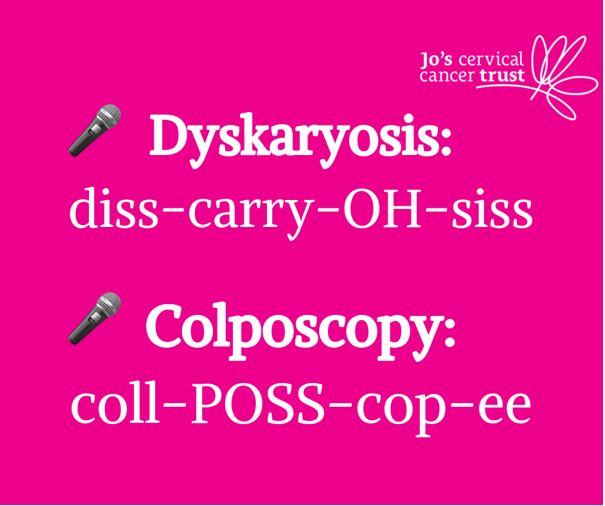“What does it all mean?!” – We answer your most common cervical cell change questions
Last modified: 2 June 2025, 09:34
At Jo’s, we receive calls to our Helpline every single day from women who have had a cervical screening or colposcopy result they weren’t expecting. Lots are confused, many are scared and others simply do not understand what it all means.
This is why for Cervical Screening Awareness Week we’re talking about cell changes.
We want everyone with an abnormal result and everyone diagnosed with cervical cell changes (abnormal cells) to feel informed and confident about what is happening, know what to expect and most importantly know they aren’t alone. Around 220,000 women in the UK will be told they have cell changes every year (and hundreds of them call us), so if you are feeling worried or lost, you are definitely not the only one.
We spoke to Hannah, one of our helpliners, to find out what the top queries about cell changes are.
“I speak to so many people who are feeling anything from a bit confused to very vulnerable. While there’s lots of women who get in touch, the same questions come up again and again.
Having said that, there’s no such thing as a ‘stupid question’ so don’t ever feel like there’s something you can’t ask us – we really have heard it all!
Straight in at number one is: ‘How do I pronounce ‘dyskaryosis’ and ‘How do I pronounce ‘colposcopy’?!’ This comes up on almost every call about results!”
That one has a straightforward answer!

Now onto the slightly more complex queries…
1. “I have my cervical screening results letter and I don’t know what it means”
Hannah: “This is probably the number one query I get about cell changes. For lots of women, this is the first time that they ever see the terms ‘colposcopy’, ‘abnormalities’ and other terms that appear on results letters, which can be scary. It’s totally normal to feel worried or unsure. This where we come in – we have lots of information available online or you can call our Helpline, we’re here to help you make sense of it and will not be shocked or surprised by anything we hear.”
We’ve also recently created a jargon buster which deals with some FAQs about cell changes because of the volume of calls we get about them. Check it out here.
2. “I have cell changes – does this mean I have cervical cancer?”
Hannah: “Again, lots of women who call are really scared that they have cancer or are confused about the difference between cell changes and cancer. I always reassure women that cell changes are not cancer – by going to cervical screening, doctors have been able to pick up cell changes early, which can then be monitored or treated to stop them ever developing into cancer. Try to remember that cervical cancer is rare and cell changes are pretty common – this is because of the treatment that is offered.”
Questions about cells changes? Have a read of our information >
3. “I have had a biopsy or LLETZ and now have cramping and bleeding – is this normal?”
Hannah: “Lots of women call about these side effects, some are taken aback by them, others want to know how long they will last. Yes, they are unpleasant, but they are really common. Most people will have them, and some will have them more severely or for longer than others. It helps to remember that we all heal at a different pace, so be kind to yourself and don’t compare your experience to someone else’s. You might also experience a change to your vaginal discharge. This is normal too.
There are some side effects that might mean you need further treatment or have an infection. This includes discharge that smells very bad, or very heavy bleeding – heavy meaning that you are soaking through sanitary towels every hour – or you feel unwell. This could all point towards you having an infection. Try not to panic, just get in touch with your colposcopy clinic or GP so they can support you.”
You can read more about side effects after LLETZ here >
4. “How can I have HPV? I’ve only had one partner/I’m single/I’m worried my boyfriend is cheating/my boyfriend thinks I’m cheating”
Hannah: “I get so many calls from people who are worried about HPV and don’t understand where it has come from. 80% of sexually active adults will come into contact with HPV in their life. For most people, they will have no symptoms or conditions because of it and their immune system will clear it by itself. You could get HPV from the very first time you have sex or sexual contact, as it is spread via skin-to-skin contact – not just penetrative sex! – so it’s definitely not the case that only ‘promiscuous’ people get it. There’s lots of undeserved stigma around the virus, when really it’s incredibly common.”
HPV is a confusing virus because it can lie dormant in your body for many years, without causing any harm or symptoms. You can have it for a long time without knowing, so it can be hard to know when you got it or from who. It can be a surprise to see it coming up on a cervical screening result if you have not had it before, but it does not mean that anyone has been unfaithful to you, so try not to worry.”
Still confused about HPV? You can read more about it here >
If you’ve got more questions, please call our Helpline on 0808 802 8000 or go to our information pages.
Categories: cervical cell changes cervical screening
